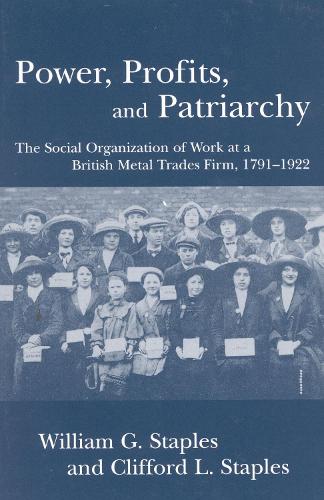
Power, Profits, and Patriarchy: The Social Organization of Work at a British Metal Trades Firm, 1791-1922
(Paperback)
Publishing Details
Power, Profits, and Patriarchy: The Social Organization of Work at a British Metal Trades Firm, 1791-1922
By (Author) William G. Staples
By (author) Clifford L. Staples
Bloomsbury Publishing PLC
Rowman & Littlefield Publishers
7th August 2001
United States
Classifications
Tertiary Education
Non Fiction
338.7672094249
Physical Properties
Paperback
224
Width 152mm, Height 224mm, Spine 13mm
295g
Description
Founded in 1791 and in existence for more than 200 years, the Kenrick iron foundry of West Bromwich, England produced some of the finest cast-iron hardware ever made. The authors' goal in studying the Kenrick case is to examine how taken-for-granted assumptions about class, gender and familiarial relations contributed to the longevity of the firm. The investigation uncovers three distinct political regimes of production that they characterize as successive forms of capitalist patriarchy. Indeed, it is contended that the Kenricks were able to maintain their power and their profits, to a great extent, because they were able to use patriarchy to solve pressing organizational problems. By balancing a concern with both the materiality of production and its ideological, cultural and political moments, this guide offers new insights into the nature of production politics, patriarchy and the historical sociology of capitalism.
Reviews
Power, Profits, and Patriarchy is an outstanding addition to the literature of labor history, industrial sociology, and gender studies. Within the context of a brisk and specific narrative, it deepens understanding of the actual processes by which industrial capitalism began, flourished, and eventually became transmogrified. Resting on exhaustive historical research and thorough engagement with the relevant historical and sociological literature, Power, Profits and Patriarchy provides unique and arresting perspectives on both the historical development of and contemporary crisis in industrial capitalism. -- Robert H. Zieger, Distinguished Professor of History, University of Florida
Power, Profits, and Patriarchy is an exhaustively researched study that clearly demonstrates how the patriarchal social distinctions characterizing different factory regimes shaped the relations between capital and labor and ultimately molded the formation of their collective interests. It is a theoretically sophisticated analysis that shows how both the material workings of an industry and assumptions about class, gender and age were central to the social organization of work in England during the Industrial Revolution. -- Sonya Rose, University of Michigan
A well-documented study of the social relations of the workplace and how these were shaped by gender assumptions. Power, Profits, and Patriarchy contributes to our understanding of the sex segregation of work and the ways hierarchical relations of class and gender reinforced and reproduced each other at the workplace. No one can read this book and continue to doubt that the development of capitalism was a gendered process. * American Journal of Sociology *
Power, Profits, and Patriarchy is a dazzling dance of history and theory. Entering the hidden abode of production of one, carefully situated, English manufacturing firm, Staples and Staples show how work is embedded in a political regime, reconfigured across three centuries through the struggles it organizesstruggles in which class and patriarchy are inextricably intertwined. Following in the footsteps of Karl Marx, they go beyond his economic analysis of the labor process to give the politics of production a new centrality both in people's lives as well as in social theory. This is ethnohistory at its very best! -- Michael Burawoy, University of California, Berkeley
Author Bio
William G. Staples is professor of sociology at the University of Kansas. Clifford L. Staples is professor of sociology at the University of North Dakota.
